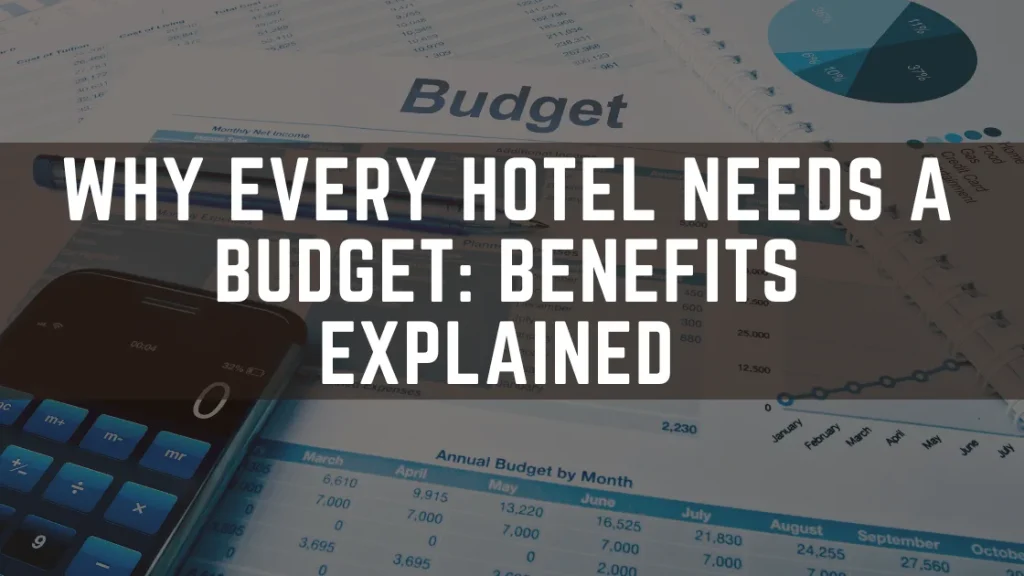For any of us working in a hotel, July is upon us and for many of us, that means one thing: Budget Season. Believe it or not, preparing a budget was often a favorite task of mine while working in hotels. So often, we move quickly as hoteliers, welcoming guests, attending revenue meetings, and managing the day-to-day operations of our business. While those revenue and sales meetings certainly incorporate strategy, that plan is often reactive to current market trends. Budgeting meetings, however, provide the opportunity to meet with peers, assess the six or seven months that have already expired, and determine what has been successful and what has not. That self-reflection then guides us in creating plans for the balance of the year at hand as well as the 12-month period that will follow.
While experienced hoteliers know that having a well-structured budget is essential for the success and sustainability of any hotel, readers of this blog may be new to the hotel industry and interested in learning more about the process of hotel budgeting. In the sections that follow, we will explain the importance of a hotel budget and the numerous benefits it brings. Just as we might see at home, a budget serves as a financial blueprint, guiding the owner of the proverbial checkbook through the complexities of daily operations and long-term planning. Without it, even the most luxurious hotels can find themselves in financial turmoil. By understanding and implementing effective budgeting practices, hotels can ensure they are well-prepared for both expected and unforeseen challenges.
Financial Planning and Control
A hotel budget provides a financial roadmap, helping directors, managers, and owners plan for future revenues and expenses. It ensures that financial resources are used effectively and helps in controlling costs. Without a budget, hotels risk overspending or underutilizing their resources, leading to financial instability and operational inefficiencies.
Effective financial planning and control through budgeting involves several key components:
- Revenue Forecasting: Predicting future income streams from various departments such as rooms, food and beverage, and other services.
- Expense Management: Keeping track of fixed and variable costs, including salaries, utilities, and maintenance.
- Cash Flow Management: Ensuring there is enough liquidity to cover daily operations and unexpected expenses.
A comprehensive budget allows managers to allocate funds appropriately, ensuring that all departments have the necessary resources to operate efficiently. It also provides a framework for setting financial targets and monitoring progress throughout the fiscal year.
Revenue Forecast
With a budget, hotels can forecast revenue from various sources such as room bookings, food and beverage sales, and additional services. This helps in setting realistic financial goals and strategies to achieve them. Accurate revenue forecasting enables hotels to make informed decisions about pricing, marketing, and service offerings, ultimately enhancing profitability.
Revenue forecasting involves predicting future financial performance based on historical data, market trends, and other relevant factors. Several methods can be employed for effective revenue forecasting:
- Historical Forecasting: Using past data to predict future revenues. This method is particularly useful for identifying trends and patterns that can inform future financial planning.
- Qualitative Forecasting: Relying on expert opinions and market analysis to make predictions. This approach is often used when historical data is limited or when significant market changes are expected.
- Quantitative Forecasting: Employing statistical methods and models to predict future revenues. Techniques such as regression analysis and time series analysis fall under this category.
For example, consider a hotel planning to introduce a new spa service. By using historical forecasting, the hotel can analyze revenue data from similar services, such as the hotel’s existing wellness and fitness facilities. They can look at the average spending per customer, the frequency of visits, and the seasonal variations in demand. Qualitative forecasting might involve consulting industry experts to understand the latest trends in spa services and guest preferences. Quantitative forecasting can be used to model different scenarios, such as varying price points and promotional strategies, to predict potential revenue outcomes.
By combining these methods, the hotel can create a comprehensive revenue forecast for the new spa service. This forecast helps in setting realistic financial goals, such as the expected return on investment, and developing strategies to achieve them. For instance, the hotel might decide to offer introductory discounts or bundling a spa service within the room rates during a slow period in order to attract initial customers and build a loyal client base.
Cost Control
Budgeting allows hotels to monitor and control their expenses, ensuring that they do not exceed their financial limits. This includes managing operational costs, labor costs, and marketing expenses. By keeping a close eye on expenses, hotels can identify areas where they can cut costs without compromising the quality of their services.
Cost control is crucial for maintaining profitability. It involves scrutinizing every aspect of hotel operations to identify potential savings. Some common areas for cost control include:
- Energy Management: Implementing energy-efficient practices to reduce utility bills. For instance, a hotel might invest in energy-saving light bulbs, motion sensors for lights in common areas, or more efficient HVAC systems. These changes can significantly reduce energy consumption and costs over time.
- Inventory Management: Keeping track of supplies and avoiding overstocking or waste. For example, a hotel can implement a computerized inventory management system that tracks usage patterns and automatically reorders supplies only when needed. This helps in preventing excess stock and reduces storage costs.
- Labor Management: Optimizing staffing levels to match occupancy rates, thus reducing payroll costs. Hotels can use flexible scheduling software to ensure that staffing levels are aligned with expected guest counts. This not only helps in controlling labor costs but also ensures that service quality is maintained during peak and off-peak times.
Let’s consider an example of cost control in the food and beverage department. A hotel might notice that its restaurant consistently exceeds its budget for food costs. By analyzing the data, management could discover that portion sizes are too large, leading to unnecessary waste. To address this, the hotel could standardize portion sizes and train staff on proper food handling and storage techniques. Additionally, implementing a system for tracking food waste can help identify further opportunities for cost savings.
Another example involves energy management. A hotel can conduct an energy audit to identify areas where energy consumption can be reduced. Simple measures such as installing LED lighting, using programmable thermostats, and educating staff on energy-saving practices can result in significant cost savings. By continuously monitoring energy usage and making adjustments, hotels can lower their utility bills and contribute to environmental sustainability.
By regularly reviewing and adjusting their budgets, hotels can ensure they are operating as efficiently as possible. This proactive approach to cost management helps in maintaining a healthy bottom line, even during challenging economic times.
Performance Evaluation
A budget serves as a benchmark against which a hotel’s financial performance can be measured. It helps in identifying areas of improvement and taking corrective actions. While these reviews are sometimes not our favorite meeting of the week, regular performance evaluations based on budget comparisons allow hotels to stay on track with their financial goals and make necessary adjustments in a timely manner.
Performance evaluation involves comparing actual financial results with budgeted figures. This process highlights variances and prompts management to investigate the causes. For instance, if a hotel’s food and beverage department is consistently exceeding its budget, it might indicate inefficiencies or the need for price adjustments.
By conducting these evaluations regularly, hotels can make data-driven decisions to improve performance. This could involve reallocating resources, adjusting marketing strategies, or implementing cost-saving measures. The continuous cycle of budgeting, monitoring, and evaluating ensures that hotels remain agile and responsive to financial challenges.
For yet another example, if a hotel finds that its marketing expenses are higher than budgeted, it might re-evaluate its marketing strategies. This could involve shifting focus to more cost-effective digital marketing campaigns, improving online review performance and engagement, or optimizing search engine marketing efforts. By identifying and addressing these variances early, hotels can stay within budget while still achieving their marketing goals.
Strategic Planning
Budgets are crucial for long-term strategic planning. They help in aligning the hotel’s financial goals with its overall business objectives, ensuring sustainable growth and development. Strategic budgeting allows hotels to prioritize investments, allocate resources efficiently, and plan for future capital improvements or upgrades.
By aligning the budget with strategic objectives, hotels can ensure they are investing in areas that will drive future growth. This forward-thinking approach helps in building a strong financial foundation and positioning the hotel for long-term success.
For instance, a hotel might decide to expand its conference facilities to attract more business clients. The budget would allocate funds for the construction, marketing to potential clients, and hiring additional staff. By planning these investments carefully and aligning them with the hotel’s strategic goals, management can ensure that the expansion contributes to the hotel’s overall success and profitability.
Risk Management
A well-prepared budget helps hotels anticipate potential financial risks and prepare contingency plans. This includes setting aside reserves for unexpected expenses and economic downturns, given the COVID-19 pandemic of 2020 and 2021, hotels know the need for this all too well. Effective risk management through budgeting ensures that hotels remain resilient in the face of financial challenges.
Risk management involves identifying potential threats to a hotel’s financial stability and developing strategies to mitigate them. Some common risks include:
- Economic Downturns: Preparing for periods of reduced demand by maintaining cash reserves.
- Natural Disasters: Allocating funds for emergency repairs and business continuity plans.
- Market Fluctuations: Diversifying revenue streams to reduce dependence on any single source.
By incorporating risk management into the budgeting process, hotels can better navigate uncertainties and protect their financial health. This proactive approach ensures that hotels are prepared to handle unexpected challenges without compromising their operations.
For example, a hotel might set aside a portion of its budget as an emergency fund to cover unexpected expenses such as sudden repairs or a drop in occupancy due to an economic downturn. Additionally, the hotel might develop contingency plans for various scenarios, ensuring that it can quickly adapt to changes in the market or other external factors. This preparedness helps in maintaining operational stability and financial health, even in adverse conditions.
Enhancing Investor Confidence
Investors and stakeholders are more likely to invest in a hotel that has a solid financial plan. A budget demonstrates the hotel’s commitment to financial stability and profitability. Clear and transparent budgeting practices can attract potential investors and enhance the confidence of existing stakeholders.
Investors look for businesses that have a clear path to profitability and sustainable growth. A detailed budget provides this assurance by outlining the hotel’s financial strategy and demonstrating its ability to manage resources effectively. By presenting a well-structured budget, hotels can showcase their financial acumen and build trust with investors.
Moreover, regular financial reporting and budget updates keep investors informed about the hotel’s performance. This transparency fosters a positive relationship with stakeholders and encourages continued investment. In today’s competitive market, having the confidence of investors can be a significant advantage for hotels seeking to expand or upgrade their facilities.
For example, if a hotel plans to renovate its guest rooms to further enhance guest experience and drive a higher average rate, a detailed budget outlining the expected costs and projected return on investment can help in securing funding from investors. By providing clear financial projections and demonstrating how the renovation aligns with the hotel’s overall strategy, management can build investor confidence and secure the necessary capital for the project.
Your Experience with Hotel Budgeting
This article provides a basic overview of hotel budgeting and why hotels need such a document to guide their financial performance. Gaining expertise in creating a hotel budget takes thoughtfulness, willingness to participate, well-researched data, practice, and a good mentor. If hotel budgeting is an area in which you hope to gain more experience, you might talk to your General Manager, Director of Revenue, Director of Sales, or other leaders within the business who guide this process each year. The hospitality industry needs colleagues like you who have a keen interest in learning more and your leadership team will certainly be happy to help guide and educate you further.
For more insights and professional assistance with hotel budgeting and ensuring your online reviews are positioned to drive your hotel revenues, visit The Reputation Lab or Contact Us for more information. Our experts can help your team maximize your review performance.




